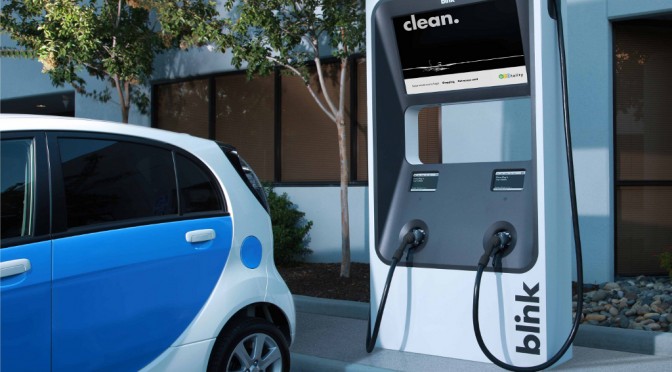By comparison, the success of electric vehicles today is a stark turnabout from nearly twenty years ago, when the EV1 died young. Environment Georgia reported that in 2011, the first year electric vehicles came back on the market in the United States, over 17,000 were purchased.
A 120-million-dollar grant from the U.S. Department of Energy to the nationwide Electric Vehicle (EV) Project aims to promote and expand the use of electric vehicles in the United States.
The EV Project has a goal of handing out 14,000 free electric vehicle chargers, including commercial host stations as well as home smart chargers, that households can use to charge electric vehicles at home.
The programme is currently being run by a company called Ecotality in nine states: Arizona, California, Georgia, Illinois, Oregon, Pennsylvania, Tennessee, Texas and Washington.
The grant is part of the American Recovery and Reinvestment Act, the economic stimulus package enacted by President Barack Obama and Congress to invest government dollars in programmes to create jobs, and, among other things, make green investments.
Free smart chargers are available to anybody who purchases a Nissan LEAF or Chevy Volt, the two most common models of electric vehicles, while businesses can host commercial chargers for free.
Shifting towards renewable energy
Proponents of the programme point out that increasing the use of electric vehicles in the United States will reduce U.S. dependence on foreign oil.
However, the electricity still must be produced somehow, and in many cases still, it is done through coal and nuclear power plants.
A recent report by Environment Georgia has found that nevertheless, switching from gasoline-powered cars to electric ones still has benefits in reducing global warming, even in a state such as Georgia, which is far behind other states in moving to renewable energy.
According to the report, over 30,000 electric vehicles are already on the road in the United States. If national projected electric vehicle sales are met, 628,773 metric tonnes of global-warming emissions will be prevented each year, based on the current energy grid across the United States.
And if the vehicles are powered solely with renewable energy, the report projects that these emissions could be reduced by more than 1.9 million metric tonnes each year.
“There are still (pollution) savings. Obviously you would see greater savings if the grid mix were to change and improve,” Jennette Gayer, executive director of Environment Georgia, told IPS.
“The great benefit to electric cars is…that they’re the only vehicle that over time gets cleaner,” Ben Echols, electric transportation program manager for Georgia Power, told IPS.
“A normal internal combustion vehicle – the cleanest it’s going to be is the day you drive off the lot….The older it gets, the dirtier it gets,” Echols said.
“The electric vehicle is going to get cleaner. We are, as a company, going to continue to lower our emissions. We’re required by federal regulations to add cleaner generation to our mix. Our mix is going to get cleaner over time,” Echols said.
Partnering to save
Georgia Power is one of the industry groups that is partnering with Ecotality. The company is offering a reduced energy rate for customers who use most of their energy at night; the rate is designed for customers with electric vehicles who are charging their cars between the hours of 11 pm and 7 am, which are considered extremely off-peak hours.
Utility companies undoubtedly stand to gain by promoting electric vehicles, which, after all, boost demand for electricity. But even though consumers must pay for electricity, the cost must also be compared to the prospect of paying for gasoline instead.
The Environment Georgia report pointed out some of the many costs of relying on oil, recalling the British Petroleum Deepwater Horizon oil spill of 2010 along the Gulf of Mexico. Electric cars have the potential to reduce such costs by shifting the reliance onto renewable energy.
“I think that electric vehicles actually help the deployment of renewables,” Gayer explained. “If we go to electric vehicles, it will be easier to go later on to renewables.”
Cleaning up the grid
Yet there are risks. “If you do a huge roll-out of electric vehicles and don’t change the grid, Georgia Power and companies can use it as excuse to push really dirty proposals. But we’re headed as a country overall – not necessarily in Georgia – we’re heading in the right direction,” Gayer said. “There are (Environmental Protection Agency) rules coming down the pike that will continue to push towards cleaning up our grid.”
Electric vehicles are indeed making a comeback. A 2006 documentary, “Who Killed the Electric Car,” shows how the oil and automobile industry conspired to prevent an electric car model, the General Motors EV1, from becoming popular in the mid-1990?s.


